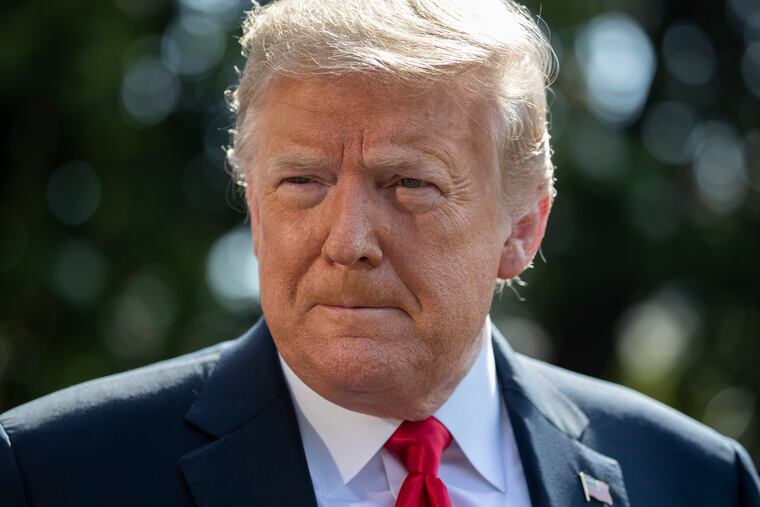Trump’s pick for ambassador involved in racist smear against black politician
President Donald Trump's nominee to be ambassador to Norway is facing demands that he abandon his pursuit of the diplomatic post after the unearthing of a 1994 court filing indicating his involvement in the production of a racist campaign flier against an African American politician in Georgia.

WASHINGTON - President Donald Trump's nominee to be ambassador to Norway is facing demands that he abandon his pursuit of the diplomatic post after the unearthing of a 1994 court filing indicating his involvement in the production of a racist campaign flier against an African American politician in Georgia.
According to the filing, Mark Burkhalter helped create the a flier that distorted and exaggerated the features of Gordon Joyner, a candidate for county commissioner in north-central Georgia. Joyner was pictured with some features darkened, a large Afro, enlarged eyebrows and a warped eye.
Joyner accused the group involved of libel and sued, resulting in an out-of-court settlement, an apology signed by Burkhalter and three other men, and payment of an undisclosed sum.
Burkhalter did not disclose his involvement in the controversy to the Senate Foreign Relations Committee, according to a letter by Sen. Robert Menendez of New Jersey, the panel's ranking Democrat, that was obtained by The Washington Post. The committee's discovery of his role has not previously been reported.
Burkhalter, a real estate developer and former Georgia state representative, did not respond to requests for comment. The State Department and the National Security Council referred questions about Burkhalter to the White House, which did not respond to requests for comment.
"These actions should disqualify anyone from Senate confirmation," Menendez wrote in a letter sent to White House Chief of staff Mark Meadows on Thursday. "During this time of national trauma and reckoning over violence and racist actions against African-Americans, however, it is unthinkable to nominate for a position of public trust an individual who participated in such a despicable, racist scheme. I therefore urge you to immediately withdraw his nomination."
Burkhalter became a target of the lawsuit during his role as campaign chairman for Mitch Skandalakis, who was at the time chairman of the Fulton County Board of Commissioners. The signed apology says the flier "contained a distorted photograph of you and inaccurate statements regarding you and attributed to you."
Burkhalter approved the flier's release, authorized payment for some of the printing costs and directed that it be attributed to a fake Political Action Committee with a fake P.O. Box address, according to court filings citing his and other depositions.
The flier sparked a controversy when it was released, with a 1995 editorial in the Atlanta Journal Constitution calling it a "racist hit piece." The filing says that during a meeting Burkhalter attended before the flier was created, attendees discussed that "white voters in North Fulton County were unaware that Gordon Joyner is black."
During a deposition, Burkhalter said the doctoring of Joyner's photo was discussed and joked about because "the face looked a little funny."
"People laughed about it at the meeting?" Burkhalter was asked.
"Yeah," he said, according to the deposition.
During the campaign, Skandalakis admitted responsibility for another flier with a photograph of Joyner next to his white opponent. "The Issue Isn't Black or White," read the flier with the word "Black" above Joyner and "White" above his opponent.
Burkhalter's nomination battle comes as Trump has attempted to fend off criticism of his response to nationwide protests demanding an end to police brutality against black people after the death of George Floyd in Minneapolis police custody on May 25.
Last weekend, the president shared a tweet that included a Trump supporter shouting "white power" at counterprotesters in central Florida, and called his supporters there "great people." After facing a wave of criticism, including from Sen. Tim Scott of South Carolina, the chamber's only black Republican, Trump deleted the tweet in a moment that underscored his bombastic and improvisational handling of the national tumult.
Joyner, who narrowly won reelection in the 1994 race and is now a private lawyer, said that when he learned that Trump had nominated Burkhalter "to be an Ambassador representing America on foreign shores, I immediately was stunned, shocked, dismayed, saddened, and very, very hurt."
Joyner told The Post that Burkhalter was a "leader in a notoriously despicable, mean, hateful, nasty, racist political campaign targeted, directed, and financed against me as a black elected official serving in office."
"The picture on the flier portrayed me as having a bigger Afro; my right eye was made to appear lower than my left eye; my eyebrows, mustache and beard were made darker; and my lower lip was made to appear thicker," he said.
The State Department declined to respond to a question about whether Burkhalter's nomination undermines its campaign to promote the department's diversity. Last month, the department's only African American assistant secretary resigned over Trump's handling of the Black Lives Matter protests.
"The president's comments and actions surrounding racial injustice and Black Americans cut sharply against my core values and convictions," Mary Elizabeth Taylor, who managed the State Department's relationship with Congress, wrote in her resignation letter.
Menendez letter urged Meadows to "ensure that the President immediately withdraws [Burkhalter's] nomination."
He added: “At a minimum, advice and consent means that we ensure that the individuals we confirm are not only experienced and qualified, but suitable for public service.”